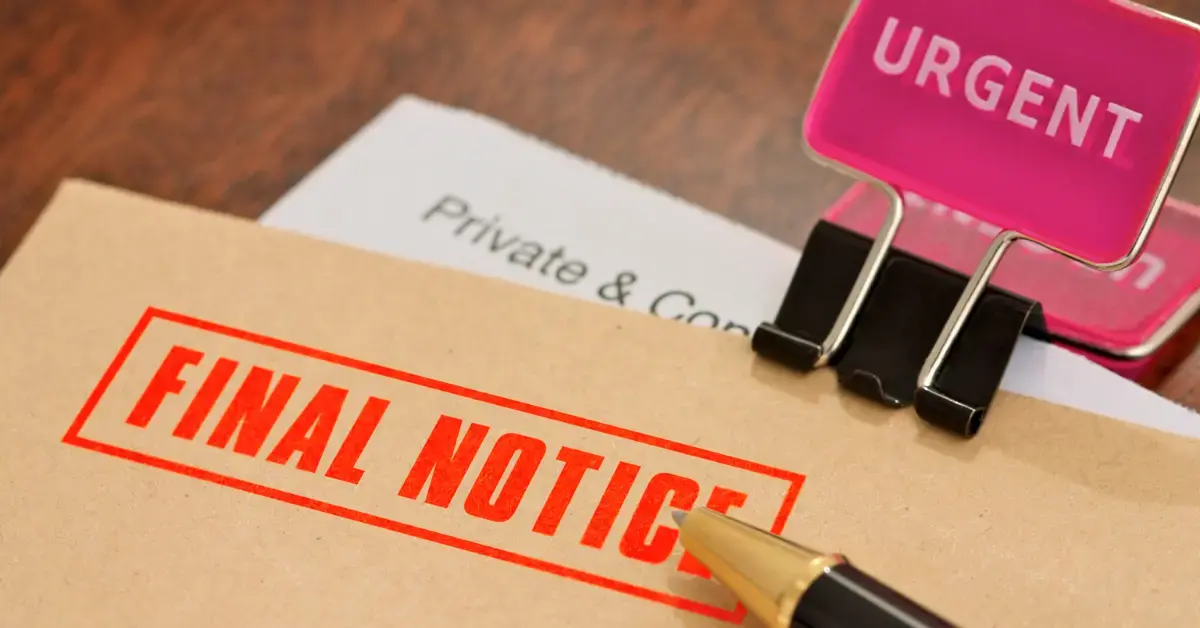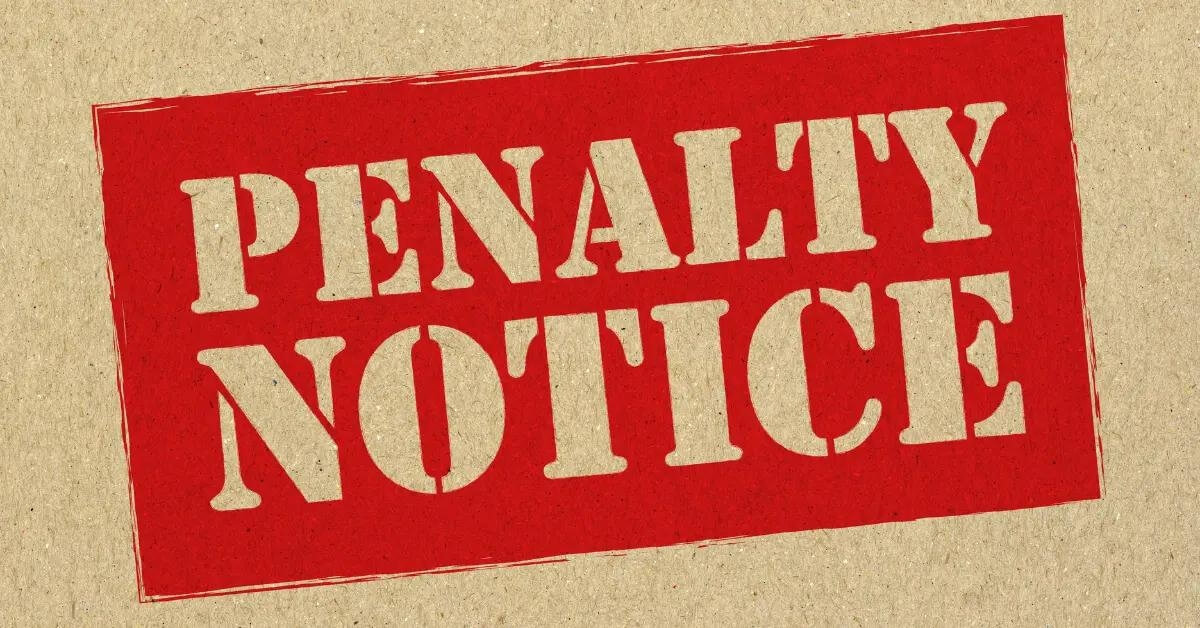Imagine opening your mailbox and finding an LT11 Notice. Your heart races. The IRS is on your doorstep, metaphorically speaking, with a final notice of intent to levy.
Yes, the government can legally seize your property if you don’t act swiftly. Let’s be real, that letter in your hand might just top the list of the most nerve-wracking mail you’ve ever opened.
From setting up payment plans to negotiating terms directly with the IRS – options exist that can prevent those feared consequences from becoming reality. One such option is to address any unfiled tax returns that may have led to this situation in the first place.
So, let’s dive into what it means when you get slapped with an LT11 Notice and how that shakes things up for us as taxpayers. This situation often feels overwhelming, but understanding your rights and options can significantly ease the process.
So, let’s get down to brass tacks on how you can handle this notice with confidence and ready yourself to face any hurdles that come your way.
Key Takeaways:
- LT11 Notice: IRS’s final notice to levy property if tax debt isn’t paid or arranged within 30 days.
- Ignoring LT11 can lead to asset seizure and passport revocation for $50k+ debt.
- Right to request Collection Due Process hearing within 30 days to discuss options or dispute levy.
- Tax relief options: installment agreement, offer in compromise, or professional help.
- Taxpayer rights during the collection process include challenging the IRS, appealing, and representation.
What is an LT11 Notice or Letter 1058?
An LT11 notice or Letter 1058 is the IRS’s way of telling you, “Hey, we haven’t gotten your tax payment yet. And if we don’t get it soon, we’re gonna have to take some serious action.”
It’s a final notice before they start seizing your property or rights to property. Yikes.
The Difference between LT11 and Letter 1058
Spoiler alert: there is no difference between an LT11 notice and Letter 1058. They’re just two names for the same thing.
The legal name is Letter 1058, but the IRS’s computer system calls it LT11. Tomato, tomahto.
Why the IRS sends notices and letters
The IRS sends out notices and letters for all sorts of reasons:
- You owe money
- They have a question about your tax return
- They need to verify your identity
- They need more info
- They changed something on your return
- There’s a delay in processing your return
Basically, if the IRS is reaching out, it’s probably important. Don’t ignore it.
What to Do When You Receive an LT11 Notice
First things first: don’t panic. But also don’t ignore it. You need to take action ASAP.
How much time do you have to respond?
You’ve got 30 days from the date on the notice to either pay up in full, set up a payment plan, or request a Collection Due Process hearing. So, if you sit on your hands and do nothing during that window of time, get ready because the IRS might just start grabbing hold of your belongings. And nobody wants that.
Right to make a Collections appeal
You have the right to request a Collection Due Process hearing with the IRS Office of Appeals within 30 days of getting the notice.
At the hearing, you can make your case for why you disagree with the proposed levy and talk about alternatives, like a streamlined installment agreement or an offer in compromise.
Requesting a CDP hearing
To request a CDP hearing, you’ll need to fill out Form 12153 and send it to the address on your LT11 notice. Make sure you get it in within 30 days of the notice date, or you could lose your right to a hearing.
Consequences of Failing to Respond to LT11 Notice
Ignoring an LT11 notice is a bad idea. A really bad idea. If you don’t pay up or make arrangements, the IRS can start helping themselves with your stuff.
Types of property the IRS can levy
The IRS can seize all kinds of property if you don’t pay your taxes, including:
- Wages and other income
- Bank accounts
- Business assets
- Personal assets (like your car or house)
- Social Security benefits
They can also file a Notice of Federal Tax Lien, which is a public record that tells your creditors the government has dibs on your current and future assets.
Effects on your passport
If you owe $50,000 or more in taxes, the IRS can ask the State Department to revoke your passport. The 2015 Fixing America’s Surface Transportation (FAST) Act requires the IRS to notify the State Department if you have “seriously delinquent tax debt.”
Once you’re certified, the State Department generally won’t issue or renew your passport until you’ve settled up with the IRS.
Tax Relief Options for LT11 Notice
If you’re staring down a hefty tax debt, don’t panic. You’ve got options.
The IRS isn’t some big, bad wolf that can’t be reasoned with. They’re pretty open to working out a plan that suits your situation.
Setting up a payment plan
One of the most straightforward solutions is an installment agreement. This lets you break down that intimidating balance into bite-sized chunks over time.
And get this: if you owe less than $50k, you can likely set the whole thing up online without even having to pick up the phone. Apply online and boom, you’re on your way to knocking out that debt.
Negotiating with the IRS
But what if you can’t afford the monthly payments? That’s where a little negotiation comes in handy.
The IRS is often willing to work out an offer in compromise, which means settling your debt for less than the full amount owed. It’s not a guaranteed deal, but it’s worth exploring if you’re in a tight spot financially.
Getting professional help
Of course, tangling with the IRS can be tricky territory. That’s where enlisting a tax pro can be a game-changer.
A savvy appeals officer or tax attorney can help you navigate the system, ensuring you get the best possible outcome for your unique situation. So, if you’re feeling a bit overwhelmed, don’t hesitate to bring in some backup.
The bottom line? You’ve got allies in your corner, ready to help you conquer that tax debt. With a little strategy and know-how, you can put that LT11 notice behind you for good.
Understanding the IRS Collection Process
Facing the IRS collection process can feel like being stuck in a maze. But once you understand the lay of the land, it’s a whole lot less daunting.
Let’s break down what you can expect, step by step.
Timeline of the collection process
First up, you’ll get a bill for your balance due. If that goes unpaid, the notices start rolling in, getting increasingly urgent with each one.
If you continue to ghost them, the IRS will eventually file a public notice of federal tax lien, letting your creditors know they’ve got dibs on your assets.
The final countdown? The big, bad LT11 notice, gives you one last chance to pay up or face enforced collection action.
Your rights during the process
But hold up, you’re not just a sitting duck in all of this. As a taxpayer, you’ve got a whole host of rights:
- The right to be informed
- The right to quality service
- The right to pay no more than the correct amount of tax
- The right to challenge the IRS’s position
- The right to appeal
- The right to finality
- The right to privacy
- The right to confidentiality
- The right to retain representation
- The right to a fair and just tax system
So if you feel like the IRS office is overstepping, don’t be afraid to stand up for yourself. You’ve got the law on your side.
The key is to stay engaged throughout the process. Ignoring those delinquent tax notices won’t make them go away. It’ll only make matters worse.
But by facing the issue head-on and exploring your options, you can navigate the IRS collection process with confidence. And who knows? You might just come out on the other side with a resolution that works for everyone involved.
Handle Your LT11 Notice With Experienced Tax Professionals
So, there you have it. The LT11 Notice might feel like a heavyweight champ knocking on your door, but in reality, it’s more of a wake-up call than a knockout punch. It signals not the end but the beginning of taking back control from what feels like an IRS chokehold.
The journey from panic to peace with an LT11 Notice is less about dodging bullets and more about stepping into the ring prepared. With 30 days on the clock, choices become clear: settle up or step up to the challenge. And guess what? You’ve got moves.
Whether you’re setting up payment plans or going toe-to-toe for your rights in appeals court – options abound that can flip this script entirely. Just when things seem dire, remember: levies aren’t set in stone; they’re more like detours on your financial roadmap.
For more information or to work with experienced tax professionals, contact Silver Tax Group today!








